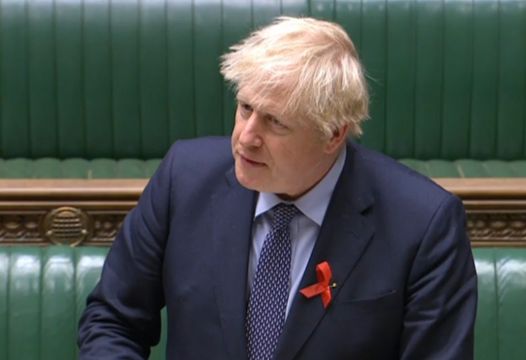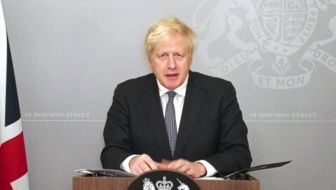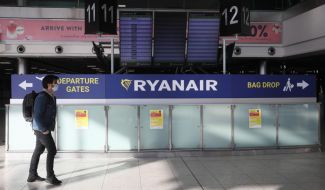England is set for a strengthened tiered system of coronavirus restrictions after MPs backed the measures, despite Boris Johnson suffering a large rebellion from his own party.
Their support means 99 per cent of England will enter the toughest Tier 2 and 3 restrictions, preventing them from mixing indoors with other households when the country's second national lockdown ends on Wednesday.
The UK House of Commons voted by 291 votes to 78 – a majority of 213 – for the new restrictions on Tuesday evening.
Fifty-five Conservatives rebelled over the measures, with 52 voting against the government, a further two acting as tellers for the noes and one formally abstaining.
But the measures passed with Labour ordering its MPs to abstain after party leader Keir Starmer warned the plans pose a “significant” health risk.
A government spokesman welcomed the Commons’ backing, which the House of Lords later approved, in order to “help to safeguard the gains made during the past month and keep the virus under control”.
But he said that ministers will “continue to work with MPs who have expressed concerns in recent days”.
Rebel leader Mark Harper, a Conservative former chief whip, urged the government to listen to the warnings from opponents to Mr Johnson’s restrictions.
The MP, who chairs the Covid Recovery Group of Tory lockdown-sceptics, said: “We very much regret that in a moment of national crisis so many of us felt forced to vote against the measures that the Government was proposing.
“We must find a way to break the transmission of the disease, recapture the public’s support and confidence, end this devastating cycle of repeated restrictions and start living in a sustainable way until an effective and safe vaccine is successfully rolled out across the population.”
Tory revolt
The Tory revolt was a significant increase on the 34 who rebelled against the second lockdown during a vote last month and the 44 who defied the Government on the 10pm hospitality curfew.
A further sixteen Conservative MPs had no vote recorded for them on Tuesday. While some will be abstentions, others may have had valid reasons for being unable to vote.
Fifteen Labour MPs also defied party orders and voted against the regulations, including allies of former Labour leader Jeremy Corbyn in a clear warning to Mr Starmer.
Mr Corbyn, who also voted against the measures, is currently sitting as an independent MP after his successor refused to hand him back the party whip over his response to the damning report into anti-Semitism.
Earlier in the day, Mr Johnson announced a one-off payment of £1,000 (€1,100) for pubs forced to remain closed under the restrictions in an attempt to reduce the scale of the revolt, though the move was branded “derisory” by the trade.
And he acknowledged concerns of a perceived “injustice” in the allocation of tiers but reassured MPs that the government would look at a more focused approach in the future.
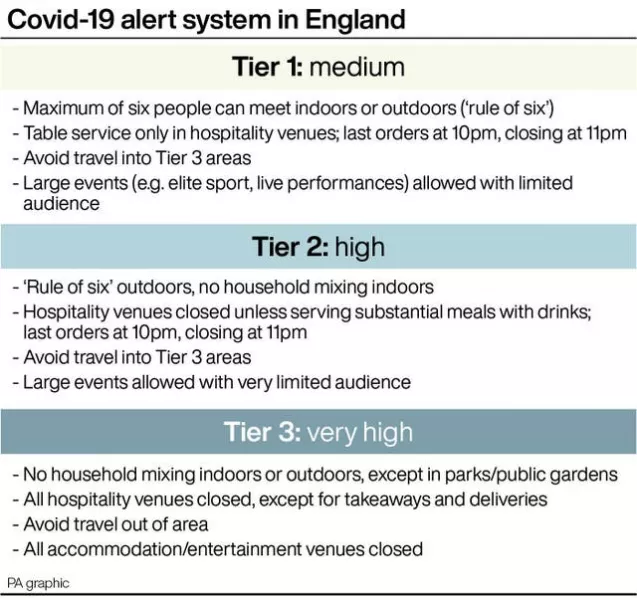
Most pubs in the country will face hampered trade by the measures.
Those in Tier 2, which will cover 57 per cent of England’s population, will only be able to serve alcohol alongside a “substantial meal” and must obey rules restricting household mixing indoors.
In Tier 3, pubs and restaurants will only be able to offer takeaway and delivery services.
Kate Nicholls, chief executive of trade body UKHospitality, said: “A one-off payment of £1,000 for pubs forced to close does not even count as a token gesture.”
The tiers will be reviewed every fortnight and Mr Johnson promised MPs a fresh vote on whether to keep the system before February 2nd.
Tory backbenchers were outraged that the Government’s impact assessments on the three-tiered system did not include a detailed breakdown of the economic effects of the measures.
Their anger was further compounded by a report in the Times which revealed the existence of a Whitehall dashboard detailing Covid-19’s impact on almost 40 sectors of the economy.
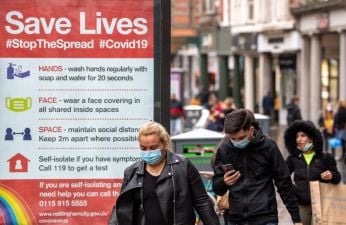
A red rating, which indicates significant job cuts and revenue losses, was said to be against dozens of them, including aerospace, the automotive industry, retail, hospitality, tourism, arts and sport.
For Labour, Mr Starmer said Mr Johnson’s strategy posed a “significant” health risk and it was “highly unlikely” to see restrictions eased in parts of the country before Christmas.
He accused Mr Johnson of “overpromising and under-delivering” by pursuing an approach of short-term decisions that then “bump into the harsh reality of the virus”.
